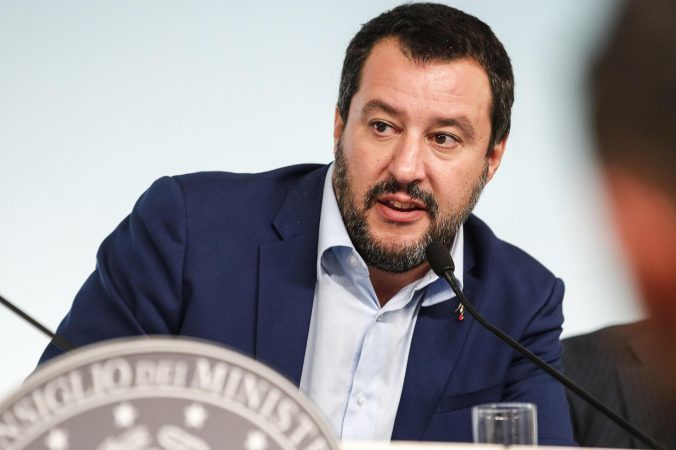
Jul 4, 2019 | News
The ICJ called today on the Italian Government to reject the incendiary statements issued by Matteo Salvini, Vice-President of the Council of Ministers and Minister of Interior, calling for the “reform” of the judiciary after a court issued a judgement with which he did not agree.
On 2 and 3 July, Minister Salvini issued a series of press statements and tweets that accused a judge in Agrigento of having made a “political judgment” for having ordered the release of the captain of the rescue boat SeaWatch3, Carola Rackete.
She is alleged to have rammed a boat of the law enforcement officers of the Guardia di Finanza in an effort to rescue 53 migrants stranded at sea for more than two weeks.
Minister Salvini followed his complaints with a direct request “to reform the judiciary, select and promote those who administer it in Italy and change the criteria of appointment, because this is not the justice that is useful for a country that wants to grow.”
“The declarations by Minister Salvini are unbecoming of a representative of an Executive and constitute a direct threat to the independence of the Italian judiciary” said Massimo Frigo, Senior Legal Adviser of the ICJ Europe Programme.
“Calling for a reform of the system of appointments and dismissal of judges in the wake of pernicious accusations of “politicization” are a clear threat to the independence of the judiciary and to any judge that would rule against the wishes of Mr Salvini,” he added.
“The Italian Government should publicly reject the threats by Matteo Salvini and ensure that any justice reform is fully in compliance with international and national constitutional standards on the independence of the judiciary”, said Frigo.
The ICJ emphasizes that international standards on the independence of the judiciary forbid such inappropriate interference with judicial process by the exective.
In that connection, the Committee of Ministers of the Council of Europe, which includes Italy, has affirmed that “[i]f commenting on judges’ decisions, the executive and legislative powers should avoid criticism that would undermine the independence of or public confidence in the judiciary. They should also avoid actions which may call into question their willingness to abide by judges’ decisions, other than stating their intention to appeal.”
On Twitter, Mr Salvini has also issued declarations that undermine the right to presumption of innocence under articles 14.2 ICCPR and 6.2 ICCPR by calling Carola Rackete an “outlaw” and a “criminal” before and after the ruling of the judge on release.
The ICJ has informed the UN Special Rapporteur on the independence of judges and lawyers of the situation.
Background
On 2 July 2019, the judge for preliminary investigations (Giudice per le Indagini Preliminari – G.I.P.) of Agrigento, Sicily, Italy – i.e. the judge competent under Italian criminal procedure law to decide on the lawfulness of one’s pre-trial detention – ruled that the detention of Carola Rackete, captain of the boat SeaWatch3, was unlawful and ordered her immediate release.
The judge based her decision on the Italian Constitution that dictates the primacy of international law standards over national law. Following this principle, she found that the criminal offences of which Carola Rackete was charged could not stand.
She was accused of disregarding the orders of the Italian law enforcement officers (Guardia di Finanza) not to disembark at Lampedusa (Sicily) harbour and to have hit with her boat the boat of the Guardia di Finanza that was standing between the SeaWatch3 and the point of disembarkment. Carola Rackete held that she was acting upon her duty to rescue and disembark the people on her boat and that there was urgency to do so.
With regard to the criminal charge of “resistance or violence against a military vessel” (article 1100 of the Navigation Code), the judge found it inapplicable because the boat concerned could not be considered a “military vessel”. On the merits of the criminal offence of “resistance to a public officer under article 337 of the Criminal Code, the judge ruled that the clause of exclusion of criminal responsibility of “implementation of a duty” provided by law (article 51 Criminal Code) did apply and therefore that Carola Rackete could not hold any criminal responsibility. The duty to implement was identified as the duty of rescue at sea that international maritime law foresees for all captains of maritime vessels.
The judge ruled that such duty has primacy in Italian law and further found that the legal provision under which the Minister of Interior, Matteo Salvini, ordered the prohibition of disembarkment on Lampedusa (article 11-ter of d.lgs. 286/98, introduced by Law Decree 53/2019, the so-called “Salvini Decree-bis”) had to respect international law as envisaged by the provision itself.
Carola Rackete remains under investigation for facilitation of irregular migration under a separate criminal proceeding.
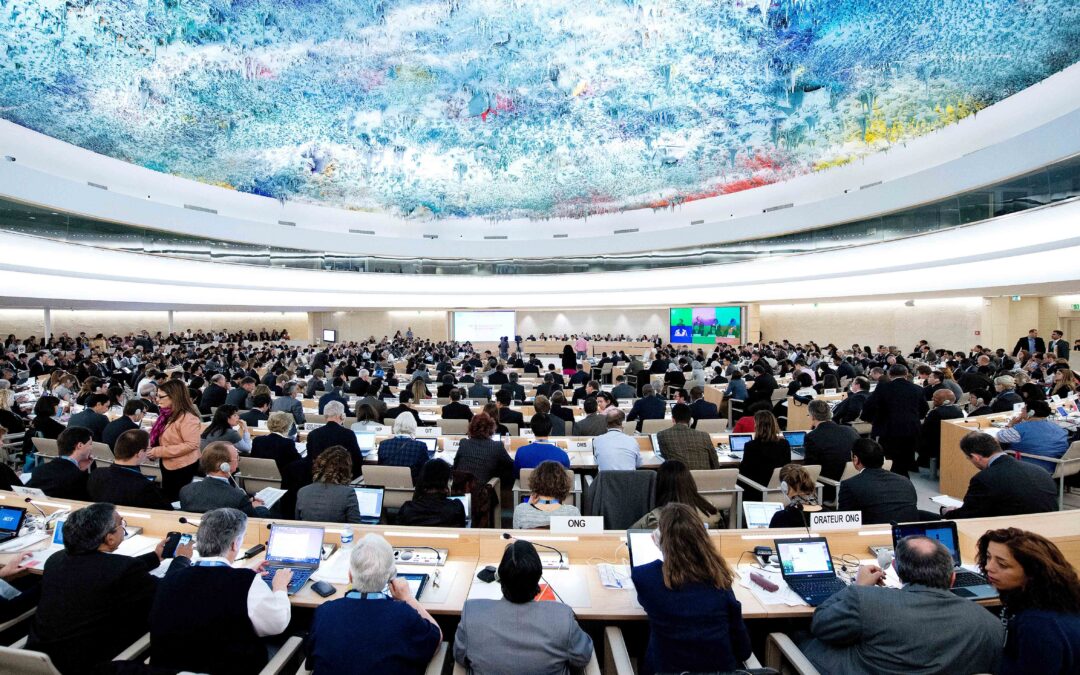
Jul 1, 2019 | Advocacy, Non-legal submissions
The ICJ today joined other NGOs in calling on States to do more to save lives and uphold human rights of migrants, including by recognising the role of civil society and creating an environment for its work.
The statement to the UN Human Rights Council, delivered on behalf of the group of NGOs by the International Catholic Migration Commission, read as follows:
“We are deeply concerned by widespread and growing violations of the human rights of migrants and an environment where those who seek to protect them are increasingly criminalized.
The Global Compact for Migration provides technical guidance and a cooperative framework for the implementation of existing legal commitments. It is mobilizing resources to support States in this.
We are asking you to do more and to do better to save lives and uphold human rights. The Compact can help you do this.
Civil Society is already using the Compact at regional and national level, often in partnership with States, for example:
- Civil society in Central America are developing a pilot programme to identify missing migrants to support States’ implementation of Objectives 8 and 9.
- Migrant Forum in Asia has led consultations with governments and other stakeholders throughout Asia.
- Cross-Regional Center for Refugees and Migrants has developed a baseline assessment on the GCM for the MENA region.
- The International Detention Coalition is working with States to develop a cross regional platform on alternatives to child immigration detention in line with Objective 13(h)
We believe these activities can inspire similar measures, but we need all States to create an environment that enables us to do so and we need all States to take leadership on implementation.
The human rights of migrants deserve the acknowledgement, respect, and urgent action of all of us.”
Delivered by the International Catholic Migration Commission, the statement was co-sponsored by the following ECOSOC accredited NGOs:
- ACT Alliance
- Alianza Americas
- Asylum Access
- Caritas Internationalis
- Congregation of Our Lady of Charity of the Good Shepherd
- Congregations of St. Joseph
- Defence for Children International
- International Catholic Migration Commission
- International Commission of Jurists
- International Council of Voluntary Associations (ICVA)
- International Detention Coalition
- International Movement Against All Forms of Discrimination and Racism (IMADR)
- Migrant Forum in Asia
- Save the Children
- Terre des Hommes International Federation
- Translators without Borders
- Vivat International
- World Organization for Early Childhood Education (OMEP)
The statement was also supported by the following NGOs and networks who do not have ECOSOC accreditation:
- Action Secours Ambulance (ASA)
- Asia Pacific Refugee Rights Network (APRRN)
- Asociación Rumiñahui
- Bloque latinamericano y el Caribe sobre Migración
- Casa Monarca ayuda humanitaria al migrante
- Center for Migrant Advocacy, Philippines (CMA-Phils)
- Centro de Atención y Desarrollo Integral Migrante (CADIM Oxnard)
- Centro de Recursos Centroamericanos Del Norte California (CARECEN)
- Centro de Atención a la Familia Migrante e Indígena (CAFAMI)
- Civil Society Action Committee
- Comision de Accion Social Menonita (CASM)
- Destination Unknown Network
- Estancia del Migrante González y Martínez
- FM4 – Paso Libre
- Fundación para la Justicia y el Estado Democrático de Derecho
- Global Coalition on Migration
- Institution para las Mujeres en la Migración (IMUMI)
- Instituto de Estudios y Divulgación sobre Migración (INEDIM)
- International Presentation Association
- NGO Coalition on Migration
- Organismo Cristiano de Desarrollo Intergral de Honduras (OCDIH)
- Pacific Islands Association of Non-Government Organisation (PIANGO)
- Plateforme des Organisations Nationales et Territoriales (Pont-Sch)
- Red de Mujeres del Bajío
- Red Internacional de Migración y Desarrollo
- Red Jesuita con Migrantes de América Latina y Caribe (RJM-LAC)
- Religious of the Sacred Heart of Mary
- Solidarity Centre
- The Mixed Migration Centre
- Women in Migration Network
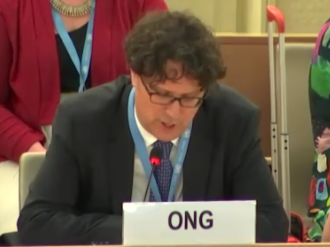
Jun 25, 2019 | Advocacy, Non-legal submissions
Speaking at the UN Human Rights Council in a general debate on the oral update of the High Commissioner for Human Rights, the ICJ addressed issues around “foreign fighters”, criminalisation of solidarity with migrants, and the need for international investigation of violations in the Philippines.
The statement was as follows (check against delivery):
“The International Commission of Jurists (ICJ) thanks the High Commissioner for her oral update.
The ICJ agrees that accountability for crimes under international law committed by foreign fighters is essential; equally, it must be ensured through fair procedures. Where children are concerned, their best interests must be the guiding principle. [To the extent foreign fighters are addressed in relation to counter-terrorism measures, ICJ emphasizes that not only is disregard for human rights in countering terrorism wrong and unlawful in itself, it is also ineffective and indeed itself conducive to terrorism.]
The ICJ is also concerned at the criminalisation of solidarity with migrants in Europe and elsewhere. No one should be penalised for supporting human rights, including those that States fail to uphold. On Thursday, together with the OHCHR and the Geneva Bar Association, ICJ will screen a documentary in Room XIV, the UN Cinema, showing the impact of criminalization of solidarity.
The ICJ supports calls by the High Commissioner and Special Procedures for urgent action by the Human Rights Council on the Philippines. Adoption of a resolution at the current session to establish an independent international investigation is essential.
The huge number of killings in the name of countering drugs is part of a broader pattern of impunity. For instance, at least 39 lawyers have also been killed under the current administration, some of whom were representing victims of human rights violations. A fully independent national commission of inquiry and measures actually to bring perpetrators to justice are also needed to end the pervasive culture of impunity.”
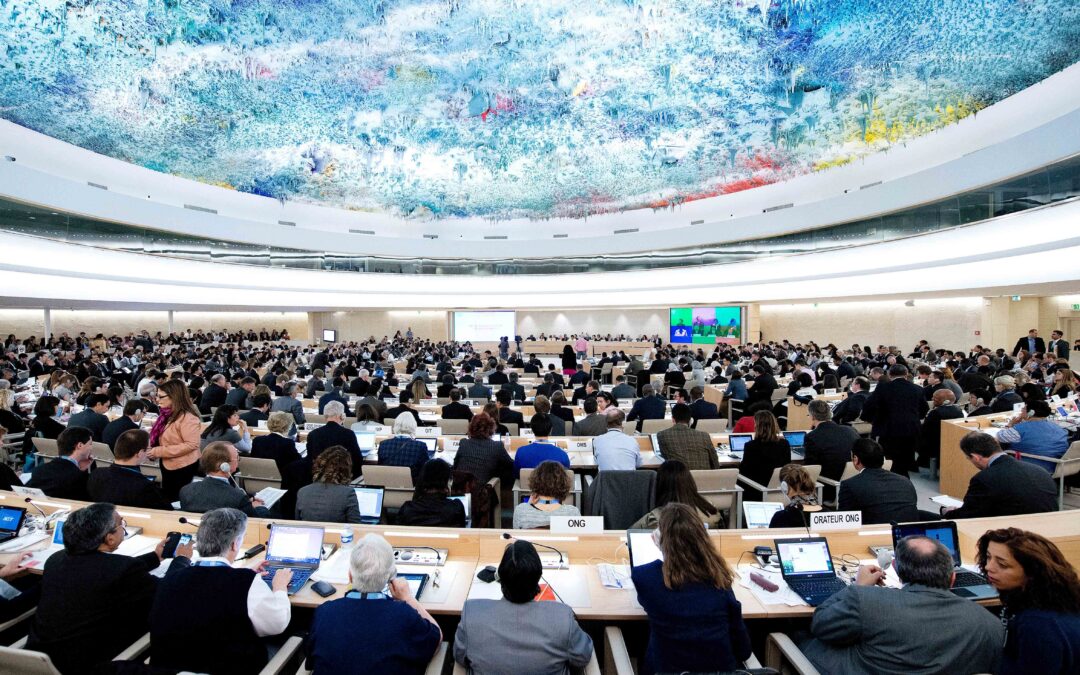
Mar 20, 2019 | Advocacy, Non-legal submissions
The ICJ today joined other NGOs in addressing the UN Human Rights Council session in Geneva, on the situation for human rights in Guatemala.
The statement, delivered by Franciscans International on behalf also of ICJ and other NGOs, read as follows (translation of Spanish original):
“We welcome the High Commissioner’s Report concerning the activities of her Office in Guatemala. We share the concerns and recommendations in the report, especially those related to the indigenous peoples, migrants and legislative initiatives that would impact in the full enjoyment of human rights.
As it was highlighted in the report, we are also concerned by the current discussions on the initiative to reform the National Reconciliation Law. This reform would give amnesty to those who committed serious crimes during the armed conflict, including those who have already been convicted. This puts at risk not only the fulfillment of the state’s obligations to end impunity, but also the security and access to justice of hundreds of victims and witnesses. Guatemala should dismiss immediately the initiative and refrain from promoting any other initiative that would promote impunity.
Additionally, the political and social tensions are intensifying towards the upcoming elections, and the inclusion of various groups, especially indigenous peoples, is at risk. Currently there is a low participation and representation of indigenous peoples in the political scene of the country. Out of 178 seats in the Congress, only 18 are occupied by Mayans (from which only two are women). The State must guarantee free participation, without intimidation or threats, of indigenous peoples running for different positions.
Lastly, the regional human rights situation of migrants is aggravating and the response by Guatemala, as evidenced in the last months, shows the lack of an effective policy to deal not only with migrants in transit, but also to create conditions to prevent forced migration of Guatemalans.
We thank the work that the Office of the High Commissioner for Human Rights has done, and we stress the importance of its activities in the country.”
The full statement may be downloaded in English and the original Spanish, in PDF format, here: HRC40-OralStatement-GDitem2-Guatemala-2019-EN-ESP
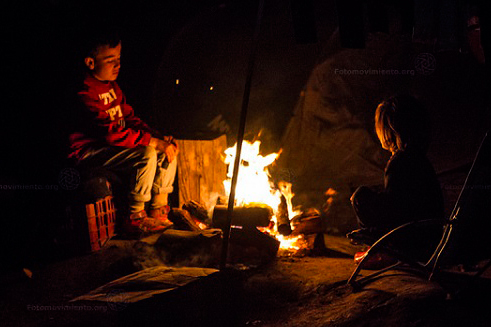
Jan 18, 2019 | News
A legal challenge to the violations of migrant children’s social rights on mainland Greece and its North Eastern Aegean islands has been lodged by the ICJ and the European Council on Refugees and Exiles (ECRE) before a European body specialized in the protection of social rights at the European level.
The legal action, taken in the form of a collective complaint to the European Committee on Social Rights, catalogues the numerous instances of Greece failing its child care and protection obligations towards migrant children by leaving them in conditions of squalor, insecurity and violence.
The complaint to the Committee, an impartial body which oversees the protection of certain economic and social rights by assessing the conformity of domestic law and practice with the European Social Charter, has been supported by the Greek Council for Refugees and includes reports from Médecins Sans Frontières on health and living conditions of migrant children in Lesvos.
Amongst the most blatant infringements of migrant children’s rights described in the complaint has been the systematic and ongoing absence of sufficient accommodation facilities and the lack of an effective guardianship system for unaccompanied children in Greece, exposing them to significant protection risks, including homelessness and placement in detention.
Such severe deficiencies in basic care facilities has led to dire living conditions which deprive children of their most fundamental rights.
Overcrowded, insalubrious and dangerous conditions prevail most obviously on the North Eastern Aegean islands where the standards of human dignity and special protection accorded to children by virtue of their particular status under international human rights law are repeatedly violated.
The complaint notes that the dearth in basic care facilities for migrants in Greece extends to medical services, particularly on the islands, which has a serious knock-on effect on hygiene, sanitation and substantive physical and mental health care and treatment for children.
In addition, mixed living arrangements, limited, if not non-existent security patrols and deficient guardianship systems have led to numerous reports of sexual abuse, violent assaults, harassment and humiliation of migrant children in camps on the Greek islands.
The consequences of the conditions listed in the complaint have been, in certain locations, children self-harming and even attempting suicide.
“Greece’s deference to the violations being committed against migrant children on its territory has gone on for far too long without any foreseeable improvement on the horizon.
Transfers of migrant children and vulnerable persons from the islands to the mainland are paralysed by a shortage of places on the mainland and administrative encumbrances.
All the while, children are left to languish in a forgotten environment of impoverishment and destitution.
This legal challenge to Greece’s indifference will hopefully pave the way for institutional condemnation and for substantive change in the protection of society’s most vulnerable” says Amanda Taylor, Senior EDAL Coordinator at the European Council on Refugees and Exiles.
“As signatory of the European Social Charter, Greece is under an international obligation to ensure that migrant children in its jurisdiction have access to basic economic and social rights. Particularly in the case of migrant children, who find themselves in a vulnerable situation, remaining even for a short period of time in such terrible conditions as currently exist in Greece, is likely to result in irreparable harm and injury and have a detrimental and non-reversible impact on their development,” said Karolína Babická, Legal Adviser for Europe and Central Asia with the ICJ.
“This complaint refers to two of the most pressing protection issues in Greece; the protection of unaccompanied minors and the conditions prevailing on the Greek islands after the launch of the EU-Turkey Statement, where migrant children are stranded. In December 2018, almost two out of three unaccompanied children in Greece were deprived of a place in long-term accommodation facility for minors. At the same time, 30% of the 14,600 persons remaining on the Greek islands were children. Thus, the procedure initiated before the European Committee of Social Rights can significantly contribute to guaranteeing the respect of migrant children’s rights in Greece,” said Alexandros Konstantinou, member of the Legal Unit of the Greek Council for Refugees.
The complaint awaits examination and determination by the European Committee on Social Rights.
As part of the complaint and in order to immediately alleviate the situation which migrant children face in Greece, ECRE and ICJ have urgently requested Greece to remove migrant children from unsuitable and overcrowded camps on the islands; to provide them with adequate and age-appropriate facilities, sufficient food, water and medical care, and with effective and competent guardians; and to remove unaccompanied migrant children from detention and place them in tailored accommodation suitable for their age.
Read the full complaint here.









